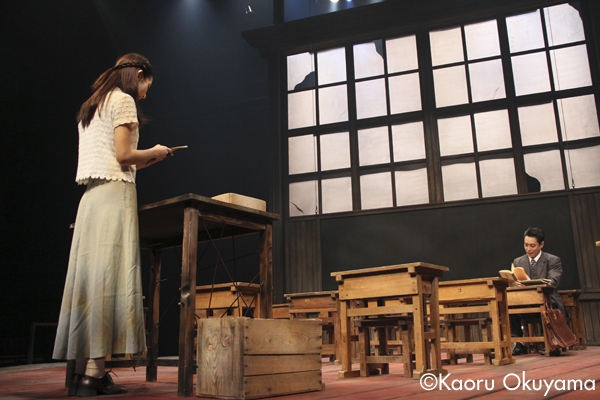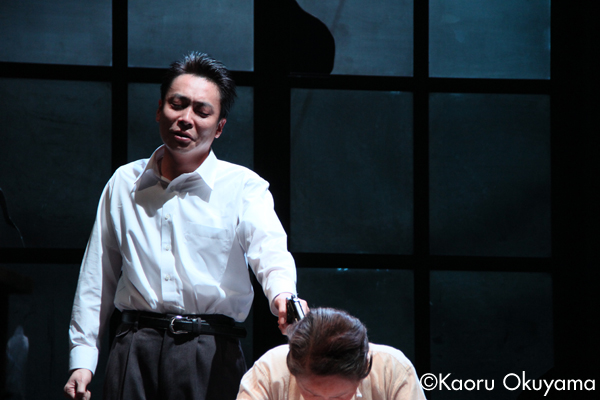The scene is the classroom of Class No. 1 of the fourth grade of an elementary school in July of 1940. A teacher-in-training named Kyoko Yanagi is making preparations for a class. Here enters the government official from the Colonial Government’s Bureau of Education named Kai. He has come to investigate an incident of anti-Japanese “graffiti” found written on a school blackboard in Korean.
A constant steam of characters come and go in the classroom, including the school principal, Negishi, a teacher named Harimoto, who is rumored to be a communist, a teacher named Chiyoda, who has studied at the Imperial University in Tokyo, a young graduate of the school named Kinoshita, who will be going to live in Japan, and a woman named Kimiyo, who works as a servant for the family of the head of the Bureau of Education, Otsuki, and has feelings for the official Kai.
The last one to enter the classroom is Jin, the father of the class president of Class No. 1, Tetsu Maruo. Jin looks at Kai and introduces himself by his Korean name but Kai leaves the room without making any response. Then Jin addresses Yanagi, saying that his son is doing well with his Japanese studies but is forgetting his Korean and eventually there will be no way for father and son to communicate with each other. All Yanagi can do is suggest that Jin begin taking Japanese lessons.
The timeframe moves to November of 1941. An elderly woman, Sada, is writing something down. Today is a holiday for the Japanese class because of the Meiji Emperor’s birthday, but Sada couldn’t read the announcement and had come to school as usual. It appears that Sada had to leave a son living in Tokyo. Tetsu is playing hide-and-go-seek with Harimoto and is hiding under the teacher’s desk. Kinoshita, recently returned from Japan, enters the classroom.
Then Kai comes in wheeling a cart of Japanese language textbooks that have been donated to their school by a Japanese school. We learn a number of new things about the characters, such as the facts that Jin comes from a formerly segregated lower social caste, that the school principal is trying to win Yanagi’s favors, that Chiyoda has decided to volunteer for the Japanese army and that Yanagi has been invited by Harimoto to join a study group working for the preservation of the Korean language.
Harimoto rushes in saying that he has found more anti-Japanese graffiti. The teachers rush to go and erase the graffiti, leaving only Yanagi in the classroom. Jin comes in and says that due to the family’s difficult financial situation, his son Tetsu is going to have to quit school and get a job. Realizing that Kai has been standing by listening to them, Jin makes Yanagi leave the room and then approaches Kai, saying, “You’re my childhood friend Guang-hi, aren’t you?” Enraged by the threat of his secret being revealed, Kai punches Jin and then throws a handful of bills at him, telling him to let his son continue his education.
As Kai leaves the room, Sada returns. The fact is that Sada was Guang-hi’s mother. After everyone has left the room, Tetsu comes out of his hiding place under the teacher’s desk crying. From the radio that Kinoshita has brought from Japan as a gift, we hear a news report that the Pacific War has begun.
The setting moves forward in time to March of 1943 and the school’s graduation ceremony. Harimoto, dressed in formal attire, enters the classroom where Jin has been by himself. It appears that the Korean language preservation study group has been deemed a subversive anti-Japanese movement and the school has been under police surveillance. Jin came to the school because he wanted to see his son Tetsu deliver his speech as representative of the graduating class, but he has been too embarrassed to go to the auditorium because of his dirty clothes. Harimoto gives Jin his formal clothes to change into. Kai and the other teachers enter the room. They encourage Jin to come to the auditorium, but he won’t move out of concern for Harimoto, who has quickly hidden himself.
Realizing this, Kai sends the other teachers out to continue their search and then begins to question the still hidden Harimoto about the writer of the graffiti and the Korean language preservation study group. Harimoto counters, asking what is wrong with trying to preserve the records of their mother tongue that are in danger of being lost. Then, Jin reveals Kai’s secret by writing his real name, Park Guang-hi, on the blackboard. Desperate to escape from poverty by going to Japan at the age of ten, Kai had hit his mother in the heat of an argument and ran away from home. Jin tells Kai that his mother is looking for her son, but Kai continues to deny everything. Instead, Kai calls the policeman, Kanemura, who is one of the graduating student’s fathers. He hands over Jin to the policeman, saying, “This is the man Harimoto you are looking for.” Jin doesn’t resist, but when the chance comes he dashes off and escapes custody.
Harimoto comes out from hiding under the teacher’s desk and Kai gives him his formal clothes so Harimoto can return to the graduation ceremony. Unnoticed, Kimiyo has been watching from the window. She calls Kai by what she now knows to be his Korean name and weeps, saying that she still wants to be with him after learning his secret. Kai sends her away to go back to the ceremony.
Knowing that Jin has been used as a scapegoat, Yanagi wants to inform the police of that fact, but Kai stops her, adding a rebuke for having become the principal’s mistress. Yanagi leaves. Alone in the classroom now, Kai is about to erase his Korean name from the blackboard, but he is stopped by Jin, now bloodied from his beating.
The setting shifts to May of 1944. Yanagi is instructing Sada in the writing of a letter [in Japanese] to her long-lost son. Yanagi is not popular at the school because her passion for teaching Japanese led her to strike a disobedient student so hard that the child momentarily lost consciousness. This incident resulted in other students refusing to come to class. Chiyoda, who has feelings for Yanagi, comes to tell her that he is going off to war.
We learn that Kai has quit his job and disappeared from the home of the Otsuki family that he had married into. Officer Kanemura comes into the classroom looking for Kai because the police have received a report that a thief caught in Japan confessed that he sold his name Soichiro Kai and his family register document to a Korean.
A half-crazed Kimiyo rushes in saying that Kai stole a gun when he left the Otsuki home. Everyone goes searching for him except Sada, who says she is waiting for her son. Kai appears behind Sada, saying that he is a friend of her son, Guang-hi and was asked by him to find her. Sada reads the letter that she has written to her son. The words are those of a mother waiting with all her heart for the return of her son.
Kai is unmoved. He talks on and on about how Sada crossed the river night after night to be with her lovers and every time one abandoned her she would take out her wrath by beating her son all through the night. But, Sada can’t understand Kai’s fast-spoken Japanese. Kai sticks a gun in Sada’s back and leads her outside.
Returning to the classroom, Yanagi runs into Jin, who tells her that his son Tetsu had been hiding an outlawed book written in Korean. The book was a publication of the Korean communist party and the anti-Japanese “graffiti” that had appeared on the school’s blackboard were words from that book written by Tetsu. Jin says he will take responsibility for his son’s crime, but his words make Yanagi feel that she must also seek forgiveness for the crime she committed in her single-minded passion to teach Japanese as the national language.
Harimoto, who was supposedly imprisoned, appears to say that graffiti has been found all over the school again. We hear the sound of two pistol shots in the distance.
Epilogue
It is now August 1945. Kinoshita, who had supposedly returned to Japan because of implications of draft evasion, is asleep in the classroom. The teachers gather, having been told that there is an important radio broadcast they must hear. The broadcast is that of the Japanese Emperor Hirohito announcing Japan’s unconditional surrender to end the war. But, even the teachers can’t understand what the Emperor is saying in the unclear recording.
Officer Kanemura appears on the scene saying that riots have started and Japanese nationals are being attacked. He says that the teachers should flee because they will also be targets. As he leaves, Kanemura says he heard a rumor that Kai always used to listen to the “Japanese Language Hour” broadcasts on the radio at the officials’ residence.
Alone now in the classroom, Yanagi opens a Japanese textbook. We see her lips move as she reads, but there is no sound. As she continues to read, a number of rocks are thrown at the windows of the classroom one after another.




